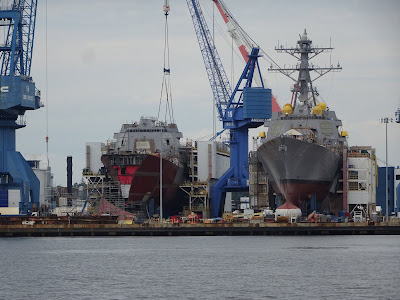After disc golf our plan was to go to the Maine Maritime Museum. The evening before Mark was looking at their web site and found that we could take a 2 1/2 tour. So, we signed up!
We had some time to walk around the museum before our tour
began.
A
full-scale replication of the Cape Elizabeth lighthouse tower lantern room. Surrounding the light is a time-lapsed video projection featuring a panorama of the Gulf of Maine that changes with the weather and seasons.
There were plenty of displays around the museum.
It was time for our tour to start. Our tour was all about Bath Iron Works (BIW).
The first part of the tour was a video entited BIW: Building America’s Navy. We saw the
process of building ships and the different ships of Bath Iron Works. Their motto is “Bath Built is Best
Built.”
BIW builds the most advanced warships in the world.
Our guide was a former employee at BIW. He was very informative and had a lot of
first-hand information about the company.
After the video we boarded the trolley for a ride past the ship yard.
I took this picture as we were driving by. Once our trolley went into the parking lot we were told to put away our cameras. No pictures were allowed. Oops!
The trolley ride was pretty short before dropping us off to
board the cruise boat.
The shipyard is located on the Kennebec River in Bath,
Maine. It was founded in 1884.
We were able to get pretty close to the shipyard.
It is very hard to grasp how large these ships are.
BWI has built private, commercial, and military vessels, most
of which have been ordered by the US Navy.
They have built and designed battleships, frigates, cruisers, and destroyers, including the Arleigh Burke class which is currently among the world’s most advanced surface warships.
ARLEIGH
BURKE-CLASS DESTROYER (DDG-51)
This
multi-mission combatant offers defense against a wide range of threats,
including ballistic missiles. The DDG-51 operates in support of carrier battle
groups, surface action groups, amphibious groups and replenishment groups,
providing a complete array of anti-submarine, anti-air and anti-surface
capabilities. Designed for survivability, the ships incorporate all-steel
construction and have gas turbine propulsion.
Since 1884 they have delivered more than 425 ships to the
worlds naval and commercial fleets.
We cruised by the dry dock.
The dry dock is a narrow basin or vessel that can be flooded to allow a load to be floated in, then drained to allow that load to come to rest on a dry platform. Dry docks are used for the construction, maintenance, and repair of ships, boats, and other watercraft.
We were also able to get a good look at the brand new
Zumwalt-Class Destroyer. This is the
last of three commissioned by the Navy and is named the Lyndon Baines Johnson, for the 36th President of the US.
ZUMWALT-CLASS
GUIDED-MISSILE DESTROYER (DDG-1000)
The DDG-1000
destroyer is the U.S. Navy's next-generation, guided-missile naval destroyer,
leading the way for a new generation of advanced multi-mission surface combat
ships. The ships will feature a low radar profile, an integrated power system
and a total ship computing environment infrastructure. Armed with an array of
weapons, the Zumwalt-class destroyers will provide offensive, distributed and
precision fires in support of forces ashore.
It was pretty awesome to get this close to these ships.
We cruised a little farther down the Kennebec River before
heading back to the museum.
Caulkers used huge quantities of pitch to seal the vessels’
deck seams. Crystallized pine resin is
melted to create warm pitch.
The first step in shipbuilding is the design
and it took place in the mould loft.
This mould loft was built in 1917.
Once the moulds for one schooner were complete, they painted the floor and started on the next design.
The museum and cruise past Bath Iron Works was very enjoyable
and worth a trip.
The next morning Mark played another round of disc golf (his
4th on this trip, if you’re keeping count) and we headed back home.




























Looks like a great day learning about ships and shipmaking. A two and a half hour tour is quite a commitment but with the ride included that'd work.
ReplyDeleteIt is always so much harder to write a blog if you can't take pictures. We went to a museum exhibit about mummies here in Phoenix and learned lots of cool stuff but no pics - so no blog!
Nice tour (booh on no pictures) and taking a cruise around their yard sounds cool.
ReplyDeleteWe didn't get to go into the building. We just drove through the parking lot and looked into the open doors. There were signs stating not to take pictures toward the building and we were told that security was watching us. Still- it was awesome seeing those giant ships being built.
ReplyDelete